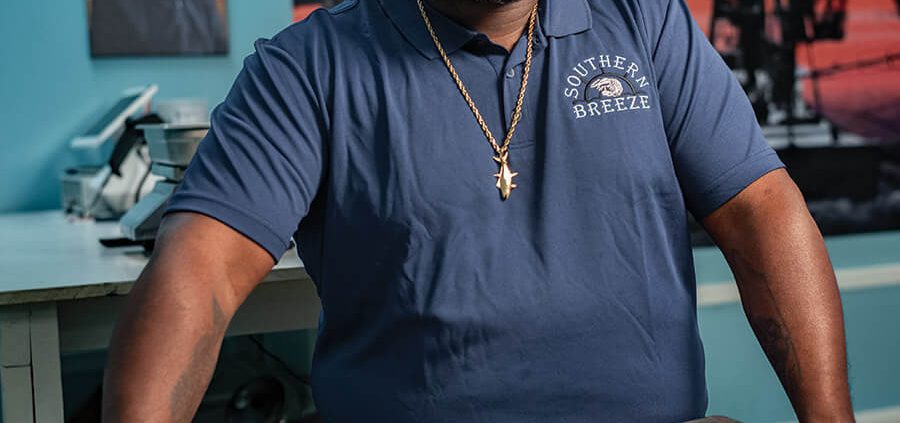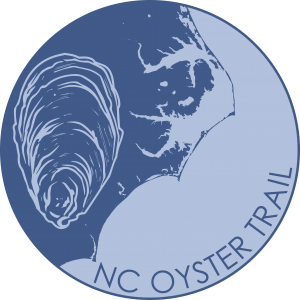Living in North Carolina: A Waterman’s Wisdom
At his seafood market in Jacksonville, a seasoned fisherman shows his customers that when it comes to our coast and the rich bounty it provides, the world is their oyster.
by Jason Frye on June 24, 2024 | Reprinted from Our State
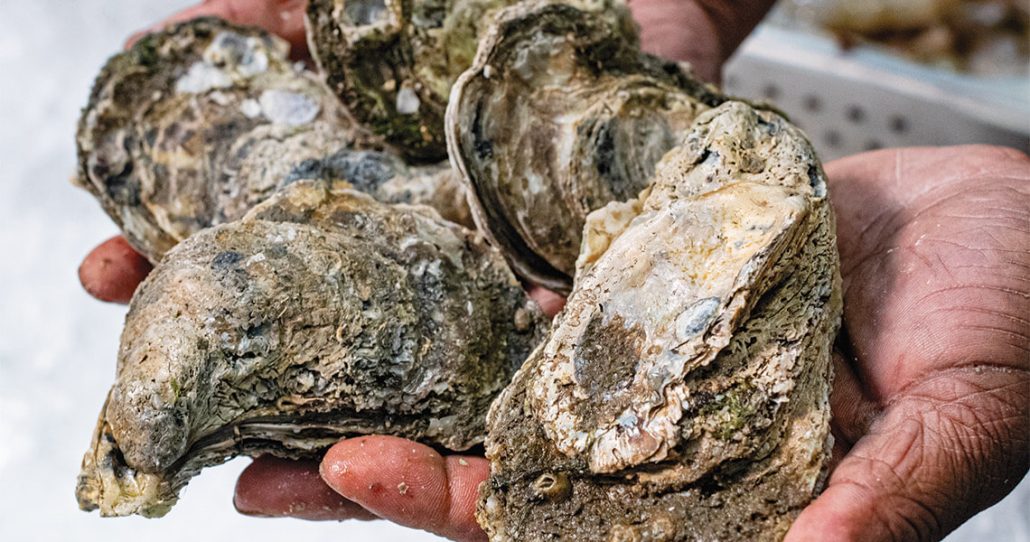
Capt. John Mallette’s customers at Southern Breeze Seafood trust him to stock their kitchens with the week’s freshest catch. PHOTOGRAPH BY CHARLES HARRIS
Southern Breeze Seafood has the clean, cold smell of an iceberg. Every day, the shop makes tons of the stuff, mounding cubes and chips into banks and ’bergs upon which the freshest of the fresh catch sits to tempt customers. Heaps of shrimp, their eyes black and oil-bright. Flounder in an orderly file. Rows of tuna steaks glowing with garnet light. A vermilion snapper, a school of spot, a rocky reef of oysters.
On the walls hang generations-old buoys and markers for crab pots, nets, and lines, their owners’ initials etched deep into the foam and cork bobbers. Baskets and shelves hold seasonings and seafood breaders, lemons and limes, corn and potatoes. Everything you need for a seafood feast.
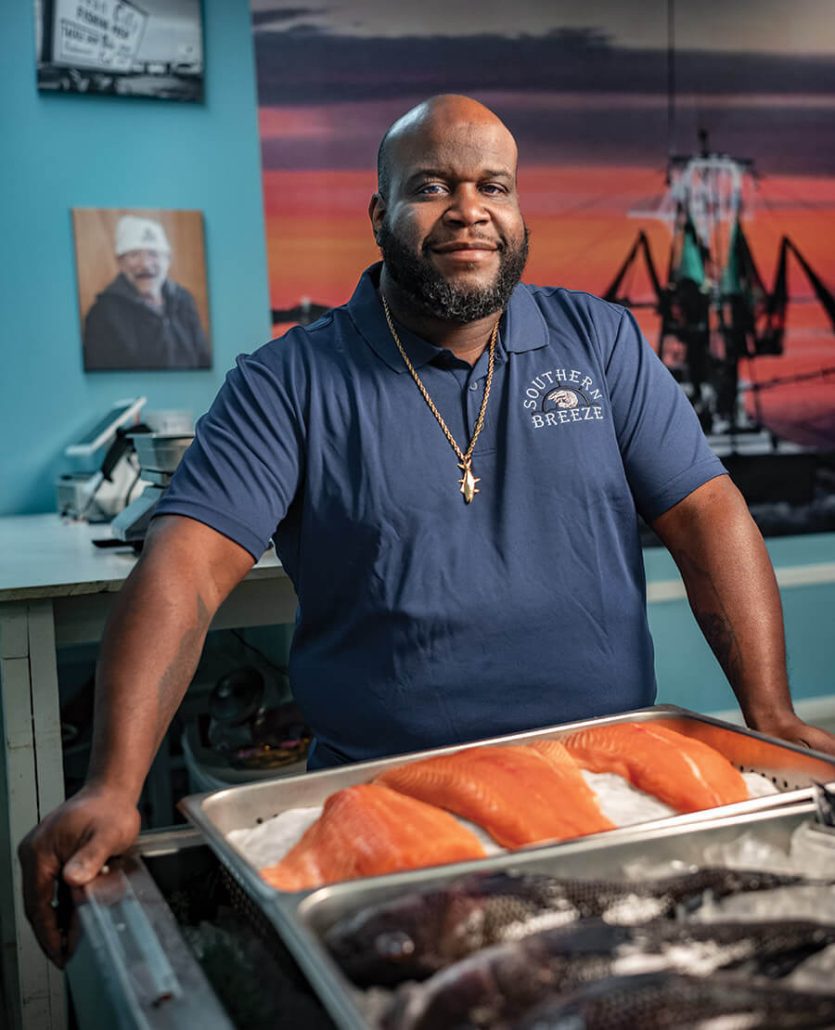
Capt. John Mallette is passionate about expanding North Carolinians’ horizons beyond the fish they’re most familiar with.
PHOTOGRAPH BY CHARLES HARRIS
What Southern Breeze Seafood doesn’t have is the odor of fish. Or cleaner or anything other than fresh. “A seafood market shouldn’t smell,” says Capt. John Mallette, a Sneads Ferry native, commercial and charter fishing captain, and co-owner of Southern Breeze Seafood. “When the seafood’s fresh, it smells like nothing.” He pauses, thinks a moment. “Maybe it’s kinda like an ocean breeze — a little salty but totally clean.”
If anyone knows about the salt-laced ocean breeze, about seafood, about the waters of North Carolina and the creatures that call them home, it’s John Mallette.
“Captain John is the epitome of southeastern North Carolina fishermen,” says Keith Rhodes, whose Wilmington restaurant, Catch, has been showcasing the chef’s own passion for North Carolina seafood since 2006. “He grew up in the industry and the lifestyle of a fisherman. I always saw him by the water, either on the docks or on the boats. He’s a real lifer in seafood.”
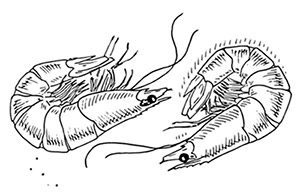
A shrimp boat travels the New River, masts spread wide like pelican wings, heading out to the ocean. A pair of trawlers stand tied to the dock, acres of red and green netting draping to their decks. Mallette watches from his booth at Riverview Café, surveying the waters where he learned the art of fishing, and pointing out the old-timers and anglers his age. He jokes that he’s been at this so long, he’s seen as an old-timer, too. He was raised on decks and docks, in fish houses and seafood markets, never far from the water, a fishing rod, the tiller of a boat.
“I was a dock rat,” he says. “Starting when I was 7, Mrs. Betty Warren would babysit me, and I spent many days at the feet of the women picking crabs and shucking oysters. Her husband, Preston, he’d take me out on his boat to shrimp. I fell in love with all of this early.”
In those days, there were more than a few shrimping and commercial fishing boats on the waters around Sneads Ferry. There were more seafood houses, too. Mallette learned to shuck and clean by watching those women and other locals. He eventually graduated from running errands suitable for a 7-year-old boy to heading shrimp and filleting flounder himself. That is, when he wasn’t culling a mess of shrimp on Preston’s boat, separating other sea life accidentally caught alongside the shrimp and tossing it overboard.
He was an apt pupil, soaking up stories and lore from the elder fishermen in the way that only young ears and a growing mind can. These men and their tales of sea and storm and days on the water filled his imagination, charting a path for the rest of his life.
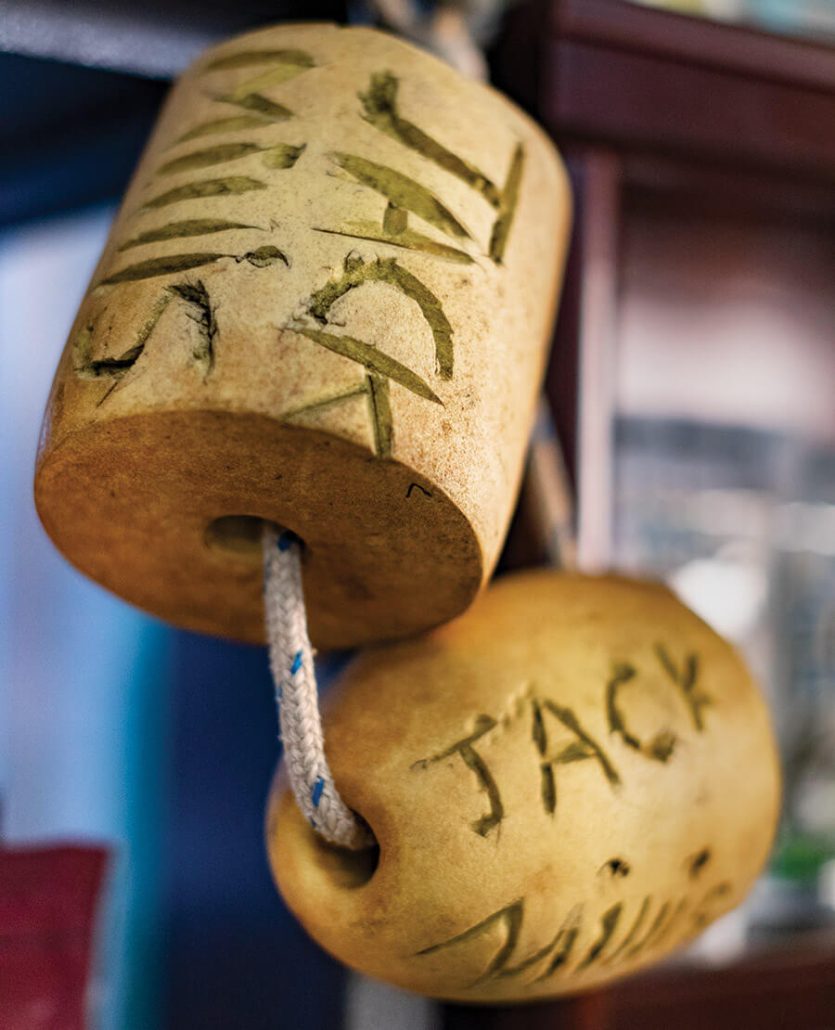
In tribute to the watermen who taught them, they display Millis’s grandfather’s fishing net floats at Southern Breeze Seafood. PHOTOGRAPH BY CHARLES HARRIS
Mallette fished. He shrimped. He dug for clams and harvested oysters. With Preston, with other Sneads Ferry fishermen, on the pier at Topsail Island’s Ocean City Beach, which at one time was the only place in North Carolina where Black people could buy seaside property. It was on the Ocean City pier where Mallette learned an important lesson.
“For a while, chefs and foodies were talking about ‘trash fish,’” he says skeptically, “but there’s no such thing as trash fish. There’s fish you know and fish you don’t know — that’s it. When I was young, I’d watch these old-timers on the pier pull up puffer fish and throw them on the boards to die — said they were no good.” He rolls his eyes. “I’d gather them up and take them home. Man, they didn’t know what they were missing.” The puffer fish in North Carolina aren’t the toxic fugu from Japan, which are dangerous or even deadly if prepared by the untrained. Mallette says that our puffers are “the true chicken of the sea. Easy to clean, easier to eat.”
Today, chefs have wised up to unfamiliar seafood, and the term “trash fish” has been replaced with “bycatch,” indicating that the species in question was an unintended catch. Mallette would like to see that term evolve, but more important, he wants to see people’s seafood-eating habits change. “My job is to educate people, to show them there’s more to eat than the six or eight species of fish they know,” he says. “I want to take these fish eaters and convert them into seafood lovers. I want folks to look at me like a butcher for seafood.”
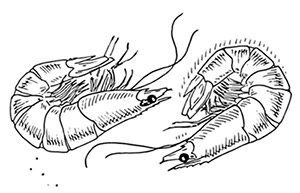
Mallette has been on course for the life of a fisherman since boyhood, and by the time he was in 10th grade, he was earning real money — by his account, some $80,000 a year. His father died before Mallette could form memories of the man, so the money he earned helped the household immensely. Which led his mother to make a startling suggestion. “She knew I loved fishing and being on the water, and she knew school didn’t interest me much,” Mallette says. “So she encouraged me to drop out, fish full-time, and get my GED as soon as I could.” It was a bold move. He left school, spent days and nights on the water, and soon after his class graduated, he earned his diploma. “Six months later I was in Australia, a hired deckhand on charter fishing trips on the Great Barrier Reef.”
Australia. Costa Rica. Panama. The Caribbean. Hawaii.
But Sneads Ferry always called him home. There, he fished, he dreamed, he saw Sneads Ferry the way it had been: waters full of fishing boats, docks busy with watermen, seafood houses awash in fresh catch. He and partner Randy Millis opened Southern Breeze Seafood, selling to the public, a raft of lauded chefs — including James Beard nominees and winners like Chef Rhodes and Chef Ricky Moore — and restaurants from Charlotte to Raleigh to Charleston, South Carolina. Mallette and Millis launched a line of seafood breaders in partnership with Oriental-based Tidewater Grain Co. — a gluten-free, non-GMO product that Mallette uses on his own food truck.
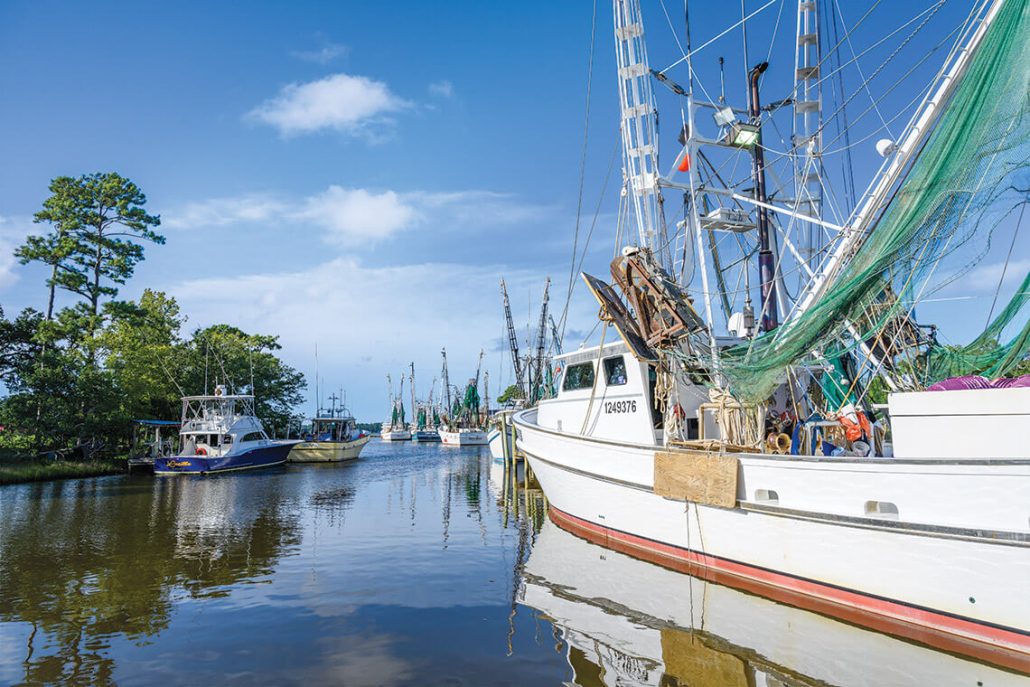
Mallette and his business partner, fifth-generation fisherman Randy Millis, grew up on shrimp trawlers in Sneads Ferry. PHOTOGRAPH BY CHRIS COUNCIL
Yet even as Mallette worked to promote and celebrate seafood from the waters he knew best, he saw a gulf growing between customers and the local fishing industry. He wanted people to understand the difference between local, domestic, and imported seafood, and to grasp the positive economic impact that customers have when they buy from local fishmongers instead of big-box grocers. He wanted to raise awareness about how often seafood sold in the U.S. is mislabeled. He wanted to help his customers understand how to buy seafood and what questions to ask when they do.
So he embarked on a mission to educate the public. He was invited to speak on the Got to Be NC stage at the State Fair. He’s done the same at other events, including the Sneads Ferry Shrimp Festival, where he sits on the board. He’s also on the board of NC Catch, a seafood advocacy group.
“John has a real vision for North Carolina seafood,” Rhodes says. “His is an important voice in NC Catch because he’s young, visionary, and so knowledgeable when it comes to fishing methods, species, regulations, and real solutions. I think of him as the meeting point of North Carolina’s fishing past and its future.”
At Southern Breeze, Mallette lives up to Rhodes’s ideal. From behind the case of fish, he greets customers by name, conversing as he portions out a pound and scoops a little extra ice into a bag. He guides them to the freshest tuna that North Carolina’s waters can offer. He talks about spot that were swimming yesterday, about local fish frys, about the way things used to be. Even though Mallette says that he’s more comfortable on the water than behind the counter, he shines as he converts fish eaters to seafood lovers, a champion for a true taste of our state.
Southern Breeze Seafood
5138 Richlands Highway
Jacksonville, NC 28540
(910) 430-4289
southernbreezeseafood.com
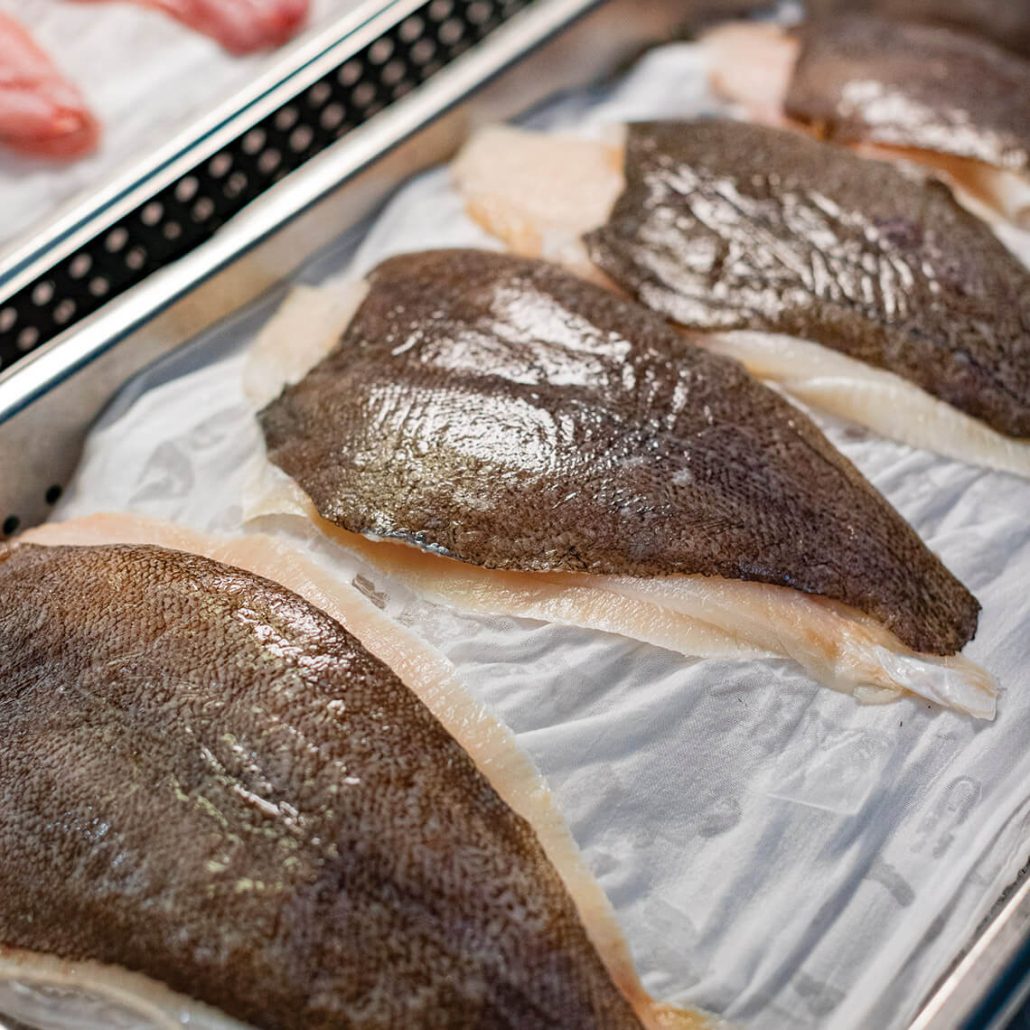
Whether customers purchase their flounder from Southern Breeze Seafood or another fishmonger, Mallette wants them to be informed about what they’re buying. PHOTOGRAPH BY CHARLES HARRIS
Six Pieces of Fish-Shopping Savvy
The butcher of seafood has advice for buying the best catch that you can find.
Develop a relationship with your local fishmonger and learn to trust them. “They know what’s fresh and in season, and they know how to cook it.”
Don’t be afraid to ask questions. Where was this caught? When was it caught? When did you get it? “These are all good questions because they show the fishmonger that you’re serious and interested.”
Learn. Explore. Try. “Take a chance on a species you’re unfamiliar with. Try a new way to cook. Grab a whole fish if you never have. We seafood lovers, we love it when you’re curious.”
Look for the seal. BAP (Best Aquaculture Practices) and MSC (Marine Stewardship Council) certifications on imported seafood “indicate that the supplier used the best industry standards to farm-raise their seafood or responsibly and sustainably catch what’s on offer.”
If you have a question, ask for packaging. “Any true and honest fishmonger wants you to be knowledgeable about seafood, so when you wonder if that salmon really was wild-caught in Norway, ask to see the packaging or a label showing its origin.”
Don’t be afraid of frozen seafood. “Unless you’re catching it yourself, odds are your seafood was frozen. Flash freezers hit temperatures of -20˚ F, freezing the catch solid quickly and keeping it just-caught-fresh for up to a year. When seafood like this is thawed properly, it’s an outstanding product.”

